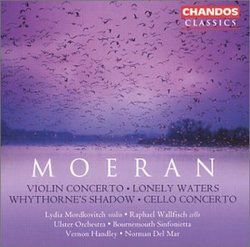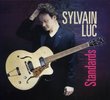| All Artists: E.J. Moeran, Norman Del Mar, Vernon Handley, Bournemouth Sinfonietta, Ulster Orchestra Title: Moeran: Violin Concerto; Lonely Waters; Whythorne's Shadow; Cello Concerto Members Wishing: 1 Total Copies: 0 Label: Chandos Original Release Date: 1/1/2000 Re-Release Date: 2/24/2004 Genre: Classical Styles: Chamber Music, Forms & Genres, Concertos, Historical Periods, Classical (c.1770-1830), Modern, 20th, & 21st Century, Instruments, Strings Number of Discs: 1 SwapaCD Credits: 1 UPC: 095115116821 |
Search - E.J. Moeran, Norman Del Mar, Vernon Handley :: Moeran: Violin Concerto; Lonely Waters; Whythorne's Shadow; Cello Concerto
 | E.J. Moeran, Norman Del Mar, Vernon Handley Moeran: Violin Concerto; Lonely Waters; Whythorne's Shadow; Cello Concerto Genre: Classical
|
Larger Image |
CD DetailsSimilar CDs |
CD ReviewsAbout as Pastorally Anglo-Irish As It Gets Moldyoldie | Motown, USA | 06/30/2009 (4 out of 5 stars) "This is my introduction to E. J. Moeran (1894-1950) whom I first read about recently and whose music was described as being firmly entrenched in the "cowpat" school of twentieth century British music, a term derogatorally coined by English serialist composer Elisabeth Lutyens to describe the more idyllically inclined music of Ralph Vaughan Williams, Gerald Finzi, and the like. Yes, the music here is nothing if not evocative of British and Irish vistas abetted by frequent none-too-subtle allusions to inherently familiar folk melodies and rhythms. One can choose to either love this music for its simple summonings or be aloof to its seeming ubiquity and triteness; there's certainly nothing threatening nor overtly challenging to be heard.
The Violin Concerto of 1937 is probably the most attractive and substantive work here -- three varying movements traversing both a soberly Romantic and homespun musical landscape. Soloist Lydia Mordkovitch produces a somewhat roughhewn sonority, especially in the lower register, but still displays an appropriately sweet-sounding rumination bookending the folksy jauntiness found in the middle movement. In painting this beautiful and amiable picture, she's very well-balanced with the vividly recorded Ulster Orchestra led by Vernon Handley. The latter also perform the near contemporaneous Lonely Waters and Whythorne's Shadow -- together representing about fifteen minutes of flowing, lovely, and mostly innocuous musical buffer. The program ends with the Cello Concerto, a later work from around the end of World War II. Soloist Raphael Wallfisch is accompanied by the Bournemouth Sinfonietta led by Norman Del Mar in a recording originally released a few years previous to the above in the mid-1980s and compellingly appended here to make for this chock-full 2004 re-release. It's perhaps too easy to say this is musically more of the same as its earlier violin counterpart -- a beautiful and pastorally inspired rumination sandwiching and infused with some lilting Irish folk stylings, this time featuring the deeply rich sonority of Wallfisch's instrument. If, perchance, there's an actual "expression" to be heard in this score, it's mostly latent in this performance, but it melds well with this uniformly peaceable and amiable program -- one, with small effort, I happened to take delight in this particular morning." |

 Track Listings (8) - Disc #1
Track Listings (8) - Disc #1
